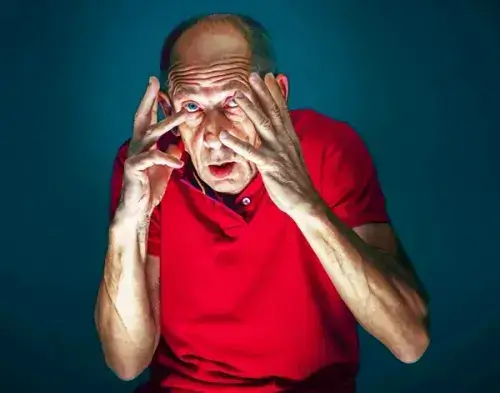Fears. Participating in the haunted house experiment at Aarhus University was an eye-opening experience that challenged my understanding of fear and its implications on health.
Fears, Personal Journey.
As I entered the eerily designed venue, a wave of anticipation washed over me. The atmosphere was charged with a mix of excitement and dread, fostering an intriguing environment that promised to induce fear in a controlled manner.
Each room was set up with meticulous attention to detail, from flickering lights to chilling sound effects, designed to elicit genuine fear responses.
As I navigated through the haunted house, my heart raced with every subtle sound and sudden movement.
The initial feelings of apprehension soon transformed into an exhilarating thrill; I found myself screaming at unexpected frights, feeling an adrenaline rush with each encounter.
This rollercoaster of emotions brought to light the fascinating interplay between fear and physical sensations.
My body responded instinctively: my pupils dilated, my breathing quickened, and my muscles tensed, illustrating how deeply fear can affect our physiological state.
Moreover, this immersive experience opened my mind to the broader implications of fear, especially within a safe environment.
What intrigued me the most was the paradox of fear itself—by facing frightening scenarios in a controlled space, I realized I was not just scared.
I was also engaging in a profound exploration of my limits.
The exotic thrill of being frightened not only heightened my awareness of my emotional landscape but also sparked a curiosity about the benefits of such experiences for the immune system and mental health.
This journey through fear allowed me to understand that embracing fear, rather than shunning it, could yield potential health benefits.
In exploring the depths of entertainment fear, I discovered a unique intersection of psychological wellness and physiological responses that emphasized the importance of understanding our emotions as drivers of health treatment.
Experiment, Controlled Approach.
The research conducted by scientists at Aarhus University aimed to explore the intriguing relationship between ‘entertainment fear’ and its impact on the human immune system.
The study involved 113 volunteers who were carefully selected to participate in this comprehensive investigation.
The scientists designed a controlled environment, ensuring that external variables were minimized to maintain the integrity of the results.
A novel method of inducing fear was utilized through a haunted house experience, whereby participants were immersed in a simulation that elicited genuine fear reactions.
Prior to the experiment, baseline physiological parameters of each participant were meticulously measured.
These included vital signs such as heart rate and blood pressure, along with immune system markers relevant to stress response.
Following this initial assessment, participants were exposed to the haunted house scenario, which was artistically crafted to provoke an authentic emotional response.
Once the experience concluded, researchers recorded physiological changes to gauge the effects of ‘entertainment fear’ on the body.
The study’s scientific team implemented strict protocols to ensure reliability and validity in the results.
Randomized control mechanisms were put in place to provide a balanced analysis of participants’ reactions.
Unbiased data collection methods were employed, permitting researchers to isolate the impact of the controlled fear-inducing stimulus from any potential psychological biases.
This emphasis on a structured experimental design helped in establishing a clear relationship between the induced fear and subsequent physiological changes in the immune system.
The significance of crafting an environment that promoted an authentic fear experience cannot be understated.
By utilizing a controlled setting, the study not only facilitated the accurate measurement of physiological responses but also contributed valuable insights into how ‘entertainment fear’ might serve as a catalyst for various immune responses, opening up new avenues for understanding the connections between psychology and physiology.
Positive Changes in Immune Response.
The recent study conducted at Aarhus University has yielded intriguing insights into the relationship between fear responses and immune function.
A significant discovery from the research is that participants who experienced fear exhibited notable positive changes in their immune responses.
Specifically, among the ten individuals who entered the study with elevated inflammation markers, a remarkable reduction was observed post-experience.
This suggests that episodic exposure to fear not only activates the body’s physiological defenses but may also reset certain aspects of immune system function.
Three days following the fear-inducing experience, researchers noted a distinct overall decrease in both white blood cells and lymphocytes among the participants.
These changes are particularly noteworthy, as they are commonly associated with the body’s inflammatory processes.
White blood cells play a crucial role in the immune response, tasked with identifying and eliminating pathogens. A decrease in their levels can indicate a shift towards a more balanced immune state, which may enhance overall health.
Similarly, lymphocytes are crucial in adaptive immunity; thus, their reduction could imply a recalibration of immune function as the body adapts to the experience of fear.
Moreover, this study provides new perspectives on how our psychological states can influence biological health.
The findings challenge traditional views that fear is solely a stressor; instead, they illustrate how controlled exposure to fear may prompt beneficial immune adjustments.
Enhanced understanding of such dynamics could inform therapeutic strategies aimed at managing inflammatory diseases and optimizing immune function.
Overall, the results from Aarhus University not only contribute to the growing body of literature on psychoneuroimmunology but also underscore the complex interplay between emotion and immune health.
The Intersection of Fear and Health.
The intriguing concept of ‘entertainment fear’ extends beyond mere psychological effects, particularly when we consider its broader implications for health and wellness.
Recent research from Aarhus University indicates that experiencing controlled fear through entertainment mediums—such as horror films or thrilling video games—may positively influence immune system function.
This phenomenon occurs as the body responds to the perceived threat, leading to an adrenaline surge, which can subsequently enhance immune activity and reduce inflammation.
Understanding these dynamics opens up new possibilities for utilizing entertainment fear as a potential tool for health improvement.
Furthermore, exploring the cultural significance of fear within entertainment could provide insights into our collective psyche.
Fear, often viewed solely as a negative experience, can cultivate resilience and coping mechanisms when engaged with in a safe environment.
The apparent health benefits arising from fear-induced scenarios suggest that individuals can confront real-life anxieties in a controlled context, which may contribute to overall emotional and physical well-being.
Such an engagement with fear in entertainment could encourage individuals to reflect on their own experiences, opening avenues for personal growth and stress relief.
To capitalize on these findings, future research directions should focus on quantitatively assessing the health benefits of entertainment fear across diverse populations.
This could include studies defining optimal levels of fear exposure for varying age groups and health conditions.
Additionally, practical applications, such as incorporating elements of entertainment fear into wellness programs, could enhance engagement in physical activities or therapeutic practices.
Ultimately, the intersection of fear and health offers an exciting frontier that warrants further exploration, potentially transforming how we approach health and wellness initiatives in the future.
Have Good Day!







Uhhhh